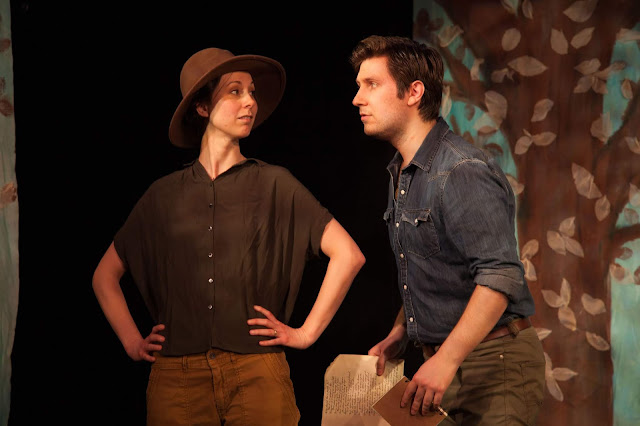Women in Power: Hedgepig Ensemble's MARY STUART
 |
| Mary Candler as Mary Stuart & Jory Murphy as Melville. Photo courtesy of Allison Stock. |
Their latest offering, Mary Stuart, by Friedrich Schiller, translated by Mike Poulton, with direction by Emily Lyon, does just that, pitting Queen Elizabeth I against the Queen of Scots, in a political thriller that's a match to any game of thrones.
Compliments must be paid to the whole design team. Playing in the somewhat inaccessible Access Theatre in downtown New York, scene designer Mike Mroch, with assistant Courtney Kupferschmidt transform the bare space into an Elizabethan cell, managing to give the audience a sense of space, of height, of palaces beyond. Their work is aptly complimented by Charlotte McPherson's light design. Special notice must go to Carsen Joenk's sound design, which elevates the show from mere intro and outro music, to something representing an aural landscape, that moves us throughout the show's many moods and locations.
Somie Pak's costume design works for the most part, with different allegiances wearing flourishes of color - especially helpful when ensemble members switch into a multitude of smaller roles, thereby switching allegiances from one house to another. Olivia Williamson as Queen Elizabeth is resplendent in a red brocade gown, while Mary Candler as Mary Stuart is well complimented in her green dress. However, the fact that only the Queens were in period garb, while others wore smart suits confused things somewhat. And Mary's gown trailed considerably, occasionally getting caught under her heels. (Congratulations to Candler who made every swish of her long train part of her character, though!)
Emily Lyon's direction is smooth and smart. Working with dramaturg Andy Baldeschwiler, it's clear that the whole cast was extremely well-prepared, making this verse - new to the audience's ears - crackle with energy and intention.
The whole cast is excellent, some pulling double and triple duty as a variety of characters, each of them required to keep a reckoning of who they're double and triple crossing, and making that apparent to the audience. Mary Candler as Mary Stuart and Olivia Williamson as Queen Elizabeth are evenly matched. The former perhaps best when she surprises herself with joy at finally speaking her mind to her cousin, while Williamson positively revels in her Elizabeth's narcissistic manipulations.
Greg Carere as Robert Dudley, the Earl of Leicester - the unfortunate lover of both Queens, caught between them - has all the flair of Errol Flynn, and all the political nuance of Alan Rickman. Leicester is easily the best written role in the play, requiring a delicate knife-edge as he plays both sides for a game even he isn't sure how to win, and Carere navigates each action with subtlety, wit, and emotion.
Mark Weatherup, Jr. plays the villainous William Cecil, Lord Burgleigh, Elizabeth's right hand man, most eager for Mary Stuart's death. In other hands, the role could become too broad or comical, but Weatherup finds moment of sincerity as well as brutality, that balance well. Thomas Valdez as Edward Mortimer energetically takes center stage for his big speech that treads between beauty and dangerous zeal as he speaks about the Catholic Church. His glee at trying to work the Queens against each other, in a youthful mockery of Leicester, leaves the audience guessing where his loyalties lie almost to the end. Most of all, this is an actor with full command of imagery and verse: keep an eye out for his future work.
Atticus Cain as George Talbot, the Earl of Shrewsbury, brings a lovely illumination to the stage as the One True Man in Elizabeth's backstabbing court. Jason Guy as Sir Amyas Paulet, Mary's noble jailor, showed an impressive range within a single character: tracing his arc from a mere lackey of Elizabeth's to a man who loves honor above all.
Debra Lass as Hannah Kennedy, Mary's nurse, is particularly effective in the scenes just above the tragic Queen's demise, allowing the audience to feel Lass' maternal grief. Zia Lawrence as Margaret Kurl and Count Aubespine, Mary's handmaid and a French ambassador, has a particularly beautiful moment also near Mary's death, which almost mirrors Lady Macduff's fury at her own traitorous husband. I'd be very interested in what Lawrence is capable of when they are given more to do.
Last, but far from least, Jory Murphy rounds out the cast as the jailer, a courtier, a messenger, and then a priest: roles which could easily have been given to any journeyman actor. However, Murphy manages to wring tears from the audience with his messenger, caught in Elizabeth's net, given the fateful duty of understanding a game of politics far beyond his ken, which ultimately leads to the execution of the Scottish Queen. Moments later, after agonizing on the floor begging for guidance, he re-enters as a priest in disguise, come to give absolution to Mary Tudor, and his stance, his voice, everything is completely and convincingly altered.
If there are criticisms of this play, they rest almost entirely with the text. While the two Queens are strong, active personalities, they are still - and perhaps understandably - not as well or subtly written as their male counterparts. Schiller, the preeminent classical writer of German Romanticism, falls into the damsel/harpy dichotomy regarding women. While Candler and Williamson, under Lyon's direction, do their utmost to round out the women, Schiller's limitations are still apparent, particularly next to the Snape-level writing he creates for Leicester, Mortimer and Paulet.
Still, it's thrilling to see the embodiment of "strong women" on the stage, not denying their femininity nor their power. And in this beautiful production of an underproduced political thriller, audiences get the fun of seeing a world where women - quite literally - rule.


Comments
Post a Comment